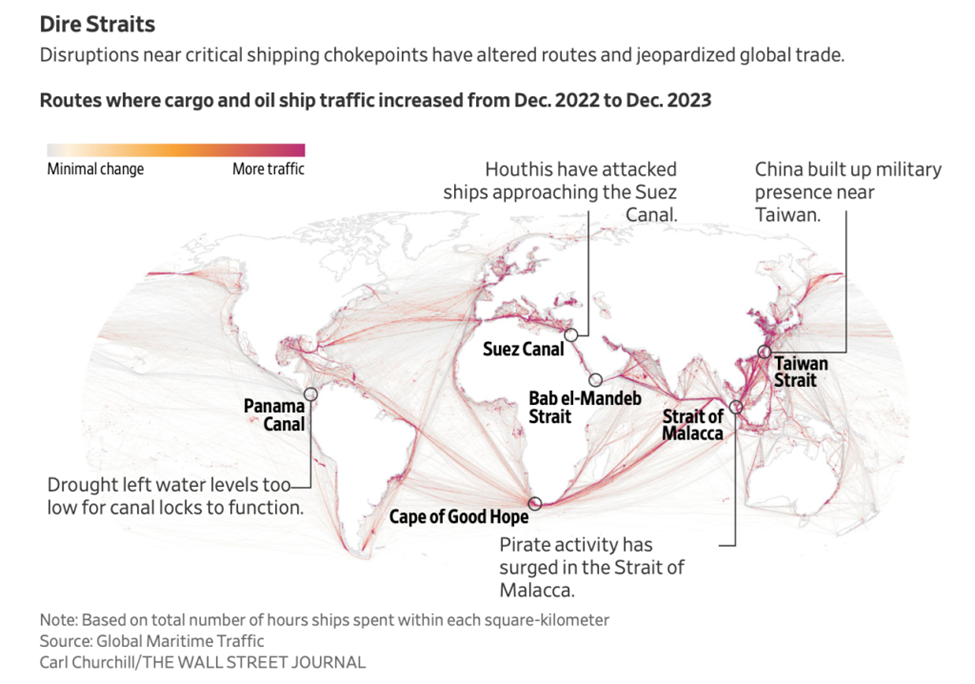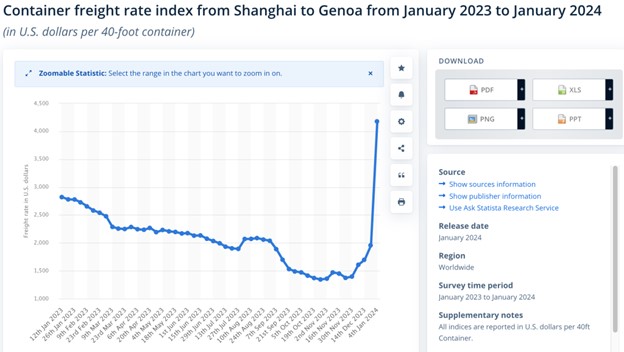The Daily Escape:

Sunrise, Camden Outer Harbor, Camden, ME – February 2024 photo by Daniel F. Dishner Photography
A quick update to Wrongo’s column, “The End Of US Naval Superiority?” which concluded by saying:
“We don’t have sufficient deterrence to keep the Red Sea and thereby, the Suez Canal, open. We can’t do enough to the Houthis to make them back down. And we won’t be able to stop them with boots on the ground.”
That’s still true, and the military situation hasn’t gotten any better. Tim Anderson, Director of the Centre for Counter Hegemonic Studies, mused on Xitter that the Houthis might have a path of escalation if the US and UK keep striking at their missile and drone launch capacity by cutting the Red Sea’s internet cables. The Houthis have denied this, but that doesn’t matter. The possibility is now out there.
From The Middle East Eye: (brackets by Wrongo)
“Egypt is a major [undersea cable] chokepoint, handling traffic from Europe to the Middle East, Asia and Africa, and vice versa. The 15 cables that cross Egypt between the Mediterranean and Red seas handle between 17% to 30% of the world population’s internet traffic, or the data of 1.3 billion to 2.3 billion people.”
Does this mean that the Houthis have a path to escalatory dominance? We also learned from CNN that a few days ago, the USS Gravely had to use its Phalanx CIWS (Close-In Weapon System) against a Houthi cruise missile that had gotten to within a mile of the ship. The Phalanx is essentially the ship’s last layer of air defense against incoming attacks. The fact that the Houthis got a missile through the AEGIS system which is the ship’s primary defense against incoming attacks by air, must be really concerning to the Pentagon. Having the possibility of a US Navy ship getting hit by the Houthis would be something that the Chinese, Russian, and Iranian navies would be watching very closely.
The economic situation hasn’t improved either. The WSJ reports that the world’s oceans are seeing an interlocking set of maritime security crises from Europe to East Asia. This raises a troubling question: How difficult will it be to preserve freedom of the seas going forward? Here’s a map showing the way shipping routes have been altered in the last year:

This is exacerbated by the way the US Navy was sidelined during America’s decades of counterterrorism fascination. It makes it difficult to defend not just the shipping lanes but also undersea data cables and gas pipelines that are equally important to global economic output. More from the WSJ:
“Even if those ships can evade Houthi missiles, they can’t hide from insurers. The rate for war insurance through the Red Sea, once a tiny percentage of the total value covered, has ballooned to 1%, a difference that many shippers deem cost-prohibitive.”
The 10,000-mile-long alternative route, circumnavigating Africa, is so fuel-intensive that cargo ships pay steep climate taxes on arrival in Europe and risk scoring failing grades on the International Maritime Organization’s carbon report index.
Adding to shipping costs is the spiking of container rates. Here’s a chart (paywalled) from Statista:

While rates remain lower than they were in 2022, the fact that freight rates have spiked is a sign that the Houthi attacks are getting the desired effect, and that the maritime industry is taking them seriously.
This is an example less of asymmetric warfare than of asymmetric objectives. Briefly, the Houthis have a simple objective – trade disruption – which is straightforward to accomplish with relatively unsophisticated weapons. The West’s objective – freedom of navigation – is much more complex and requires a large, long-term presence with the ability to operate by land, sea and air, without ever having to seize the initiative.
As we’ve said previously, ships handle more than 80% of global goods. We seem unable to stop the Houthis. So it is likely that longer lead times on imported goods are right in front of us, along with more cost in delivering them.
This is another way in which Israel and Netanyahu specifically have dragged the US and the west into an escalating dilemma. There seem to be only two options: We end Israel’s destruction of Gaza as a means to eliminate Hamas, or we escalate in Yemen.
What will Biden and the US military say is our way out of the box we’ve gotten ourselves into?
That’s enough for this weekend. It’s time for our Saturday Soother, where we try to forget about Trump, Nikki Haley and the pile of hot steaming stuff that are the House Republicans. We do that by turning off the news for at least a few minutes. Here at the Mansion of Wrong, we remain undecided about when to take down our Christmas tree. The ornaments are packed away, but Wrongo likes looking at the lights in the evenings. Maybe just before company arrives for Super Bowl weekend.
To help on your way to unplug from the news, start by brewing up a vente cup of Frank Sumatra coffee ($13.95 for 12oz) from Camden, ME’s Coffee on the Porch. It is said to be a fun and lively roast with notes of nutmeg, dark chocolate, and a fruity zing. Who doesn’t like a fruity zing?
Now grab a seat by a window to watch and listen to Ravel’s “Boléro” performed by Prequell live in Paris. The backstory to this performance is that it was part of Paris’ 2017 campaign to host the 2024 Summer Olympics. The city wanted to create a moment combining the city’s history, culture and sporting spirit using the Seine river. One project was this performance of “Boléro” on a 100-meter track floating on the Seine.
It showcases French classical music with a floating orchestra, arranged in a straight line, playing Ravel’s “Boléro”. As you know, Paris was successful in its bid for the 2023 summer games.
Watch and listen to Ravel’s masterful earworm:
